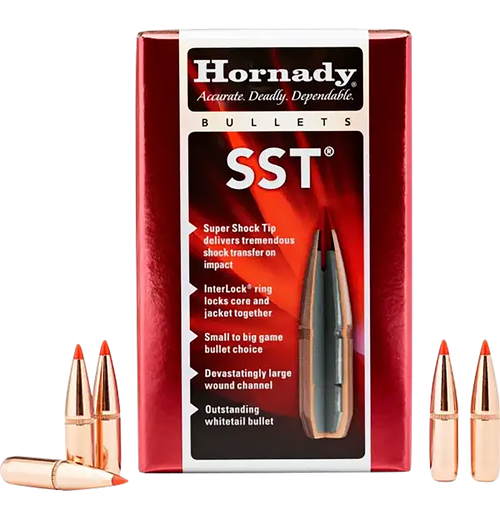The Hornady 3142 SST delivers devastating terminal performance for 7.62x39 applications with its polymer-tipped design that initiates controlled expansion at all velocities. This 123-grain projectile features Hornady's proven Super Shock Tip technology, combining the ballistic coefficient advantages of a spitzer point with the terminal performance of a hollow point.
What Makes This Different
The SST's polymer tip drives deep into the lead core upon impact, creating massive expansion while the boat tail design maintains velocity and accuracy downrange. Unlike standard soft point bullets that can fail to expand at lower velocities, the SST initiates expansion reliably from 1,600 fps down to 1,000 fps. The InterLock ring mechanically locks the core and jacket together, preventing separation and ensuring 80-90% weight retention.
Key Features
- 123-grain weight optimized for 7.62x39 cartridge performance
- Polymer tip initiates expansion and improves ballistic coefficient
- InterLock ring prevents core-jacket separation
- .310 diameter specifically sized for 7.62x39 bore specifications
- Boat tail design reduces drag and maintains downrange velocity
- Secant ogive profile enhances accuracy potential
- 100 bullets per box for extended shooting sessions
Field testing demonstrates consistent 1.5-2 inch groups at 100 yards when loaded properly in quality 7.62x39 cases. The SST performs effectively on medium game from 50 to 300 yards, making it suitable for hunting applications where reliable expansion is critical. The bullet maintains structural integrity through barriers while delivering controlled expansion in soft tissue.
Technical Specs
- Caliber: 7.62x39 (.310 diameter)
- Weight: 123 grains
- Bullet Type: Super Shock Tip (SST)
- Construction: Lead core with gilding metal jacket
- Tip Material: Red polymer
- Base Design: Boat tail
- Quantity: 100 bullets per box
- Sectional Density: .183
- Ballistic Coefficient: .295 (G1)
- Manufacturer: Hornady Manufacturing
The Hornady 3142 SST represents decades of bullet engineering focused on consistent terminal performance across velocity ranges. Quality control standards ensure uniform weight distribution and concentricity for precision handloading applications.








